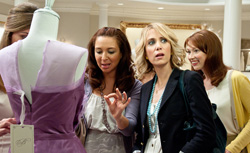Bridesmaids
The raunchy women's comedy we've been waiting for.
After you've seen Bridesmaids, check out our Spoiler Special discussion:
You can also download the program here, or you can subscribe to the Spoiler Special podcast feed via iTunes or directly with our RSS feed.
Hallelujah and praise the Lord for Paul Feig's Bridesmaids (Universal), a movie we've been awaiting for what feels like forever. At long last, we have a smart comedy with dumb jokes—a giddy feminist manifesto that responds to the perennially circulated head-scratcher "Can women really be funny?" with a whoopee-cushion fart. I loved virtually every minute of Bridesmaids and forgave its few missteps the way you forgive your best friend for being a good-hearted klutz.
"Good-hearted klutz" also describes this movie's heroine, Annie (Kristen Wiig), a single woman in her 30s in Milwaukee. (Am I the only one who sees a Laverne & Shirley shout-out in the choice to set a film about female friendship in that town?) Annie's startup business, a bakery, folded during the recession; she's miserably employed as a clerk in a jewelry shop, hates her weird English roommates, drives a piece-of-shit car, and occasionally sleeps with a dimwitted playboy (a divinely funny Jon Hamm) who openly admits she's his "third in line." Annie's life is a wreck, which makes it hard to look happy when her childhood best friend, Lillian (Maya Rudolph), announces her engagement. Lillian chooses Annie as her maid of honor, but at the engagement party, a rival emerges: the formidable Helen (Rose Byrne), who's gorgeous, rich, sophisticated, and dauntingly competent at the detail-oriented lunacy that wedding planning entails.
During the party, Annie and Helen square off in an escalating battle of sentimental toasts that's the movie's first big comic set piece. From then on, the increasingly frazzled and resentful Annie can't seem to do anything right. The restaurant she picks for a pre-shopping-trip lunch gives the rest of the bridesmaids food poisoning (leading to a gross-out scene in a chichi bridal shop that will make even the non-scatologically inclined laugh at its sheer operatic excess). Her idea for a bridal-shower party theme gets shot down (and subsequently stolen) by the passive-aggressive Helen. And a bachelorette-party trip to Vegas goes down in flames when Annie, terrified of flying, gets wasted on Valium and scotch and causes a scene in the first-class cabin.
I won't give away any more of Bridesmaids' jokes, though the humor, in most cases, derives less from the gags than from how far Wiig (along with Annie Mumolo, who co-wrote the script with Wiig and who appears in a brief cameo) is willing to take them. In many scenes, a simple comic idea gets elaborated on in endless variations, each more unhinged than the last. A sequence near the end, in which Annie tries to get herself arrested by driving again and again past a cop car, breaking a different law each time, had the audience on the floor. And Annie's climactic freakout at the bridal shower that Helen hosts—an absurdly over-the-top event involving 6-foot-tall chocolate fountains and puppies in pink berets—was all the funnier for its core of emotional truth. We may not all have writhed on the ground beneath a giant heart-shaped cookie while screaming "Are you fucking kidding me?", but we've all felt jealous when a glamorous new friend moves in on our old buddy.
This emotional core is what makes Bridesmaids such a triumph: Rather than a string of sketches tied loosely together with plot (which accurately describes even the best of the Apatow-produced comedies of recent years), this is a funny movie that tells a real story. Annie and Lillian's friendship is complex, ambivalent, and utterly believable; an early scene in which they make each other laugh by blacking out their teeth with cake crumbs tells us all we need to know about their lifelong bond. Though Annie diffidently pursues a relationship with a sexy Irish cop (the refreshingly unbland Chris O'Dowd), male-female bonds play a decidedly secondary role in the plot—as far as I can remember, Lillian's fiance never utters a single line.
In interviews, Wiig and Mumolo have admitted that some of Bridesmaids' raunchier set pieces, including the bridal-shop barf-fest, were inserted into the script by Feig and Apatow to bring male audiences into the theater. The seams between these sections and the rest of the film do show, but the brio and conviction of the cast make the whole thing work. Wiig is a revelation as the self-destructive sad sack Annie. Her comic chops get tested more rigorously than they ever were on Saturday Night Live—where chucking her dignity to the wind for a laugh is Wiig's stock in trade. Her quiet dramatic scenes, including a few with the late Jill Clayburgh as her mother, impress even more. Rudolph and Byrne have some brilliant moments too (stay for the final credits to see Rudolph at her rubber-faced best), and Melissa McCarthy of TV's Mike and Molly brings an unexpected sweetness to her role as the groom's crass sister.
Don't see Bridesmaids because it's your social responsibility (though helping this movie win the weekend's box office wouldn't hurt if you want to see more women behaving badly in the theater). See it because it's fucking hilarious.

